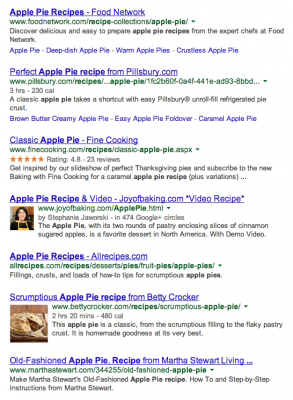 Page Content Optimization (PCO)… not Search Engine Optimization (SEO)
Page Content Optimization (PCO)… not Search Engine Optimization (SEO)
Wait. What?
There’s a big change taking place online and it has to do with the content on the pages of your website. For so many years this has all been tied to what’s known as SEO, or Search Engine Optimization.
How do I optimize my website for search engines?
- Make sure the Text of your web page is topic-specific (if the page is about Apple Pie Recipes, then don’t talk too much about Ovens or Spoons.)
- Make sure the Title of the page is relevant to the Text (Grandma’s Delicious Apple Pie Recipe)
- Make sure the URL or Address of the page includes similarly relevant keywords (www.domain.com/grandmas-delicious-apple-pie-recipe)
- Try to get relevant, popular websites to link TO your page (Pillsbury.com linking to your apple pie recipe)
And while the above instructions are still relevant, we’re seeing important changes taking place both at Search Engines like Google, and in real world usage.
While we can talk about all the other search engines out there, like Yahoo and Bing, we’re going to talk about the big one in the room and that happens to still be Google. After all, what Google does, the other search engines will copy, at least to some extent.
What’s the best way to optimize my page content for Google?
Google has always tried to provide the most accurate results to for your search. If you’re looking for Apple Pie Recipes, they don’t want to be giving back a page about Kitchen Utensils. And over the past few years they have done a really good job of ignoring low-quality web pages, as well as duplicate pages within a single domain, and pages that have content copied from other websites. As a result, they’ve been giving us a pretty clean list of good links that usually take us where we need to go.
The Past & Today
- In the past we’ve mostly used our desktop and laptop computers to search… and the long list of results have fit nicely on our larger displays.
- Over time we learned to use keywords for our search instead of using regular language… So we type “apple pie recipe” instead of “I need a recipe for grandma’s apple pie.”

Today & The Future
- More and more people are using their phones and tablets for all of their web use… and smaller screens don’t work well with long lists of search results.
- Apple’s Siri and Google’s Now are becoming very popular search-by-voice programs and can easily be seen as the future of web search. These companies know that we’d rather speak natural language than have to come up with the most valuable keywords on the spot… and type them with fat fingers on tiny keyboards.
So when you cram all of that together, it simply means that more and more people are going to be searching for your website content by SPEAKING natural language statements and QUESTIONS… and it means that your device is likely to reply back with ONE answer / link rather than a list of possible suggestions. So your goal is to be that one result.
How do I show up in Google Voice Search and Siri?
To be the one result, you need to re-think your page content. Rather than simply including quality information, your page will need to answer specific questions, and perhaps even flow conversationally. Note the red questions shown on this page!
Here’s a great example: Let’s say I want to know Barrack Obama’s birthday. Well, in the past I may have googled “Barrack Obama Birthday,” but today I would speak into my phone, “What is Barrack Obama’s birthday?” The difference is minimal, but a web page with the verbatim question is more likely to get the page view.
So, it’s simply really. You just need to begin creating page content that sounds like a conversation. Be sure to include the questions and statements that you would expect your customers to be asking / speaking. And be sure to answer these questions quickly and accurately. Finally, make it easy for visitors to share your content on services like Google+, Facebook, and other social media.


You must be logged in to post a comment.